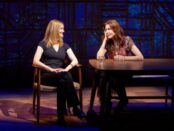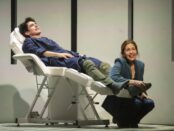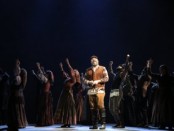Eureka Day
It's the play's best scene, an astounding mix of incredible absurdity and, for all the Zoom veterans out there, undeniable believability, especially with everyone talking and typing past each other. Still, while serving the play's humor, director Anna D. Shapiro must simultaneously contend with its overt underside, sick children, as well as a modern audience replete with the traumatic knowledge that, after the 2018-2019 school year, the worst is yet to come. Given that, it's an outright testament to the impressive comedic talents of Shapiro, Spector, and the play's ensemble that the subject matter of "Eureka Day" can remain a laughing matter. [more]







